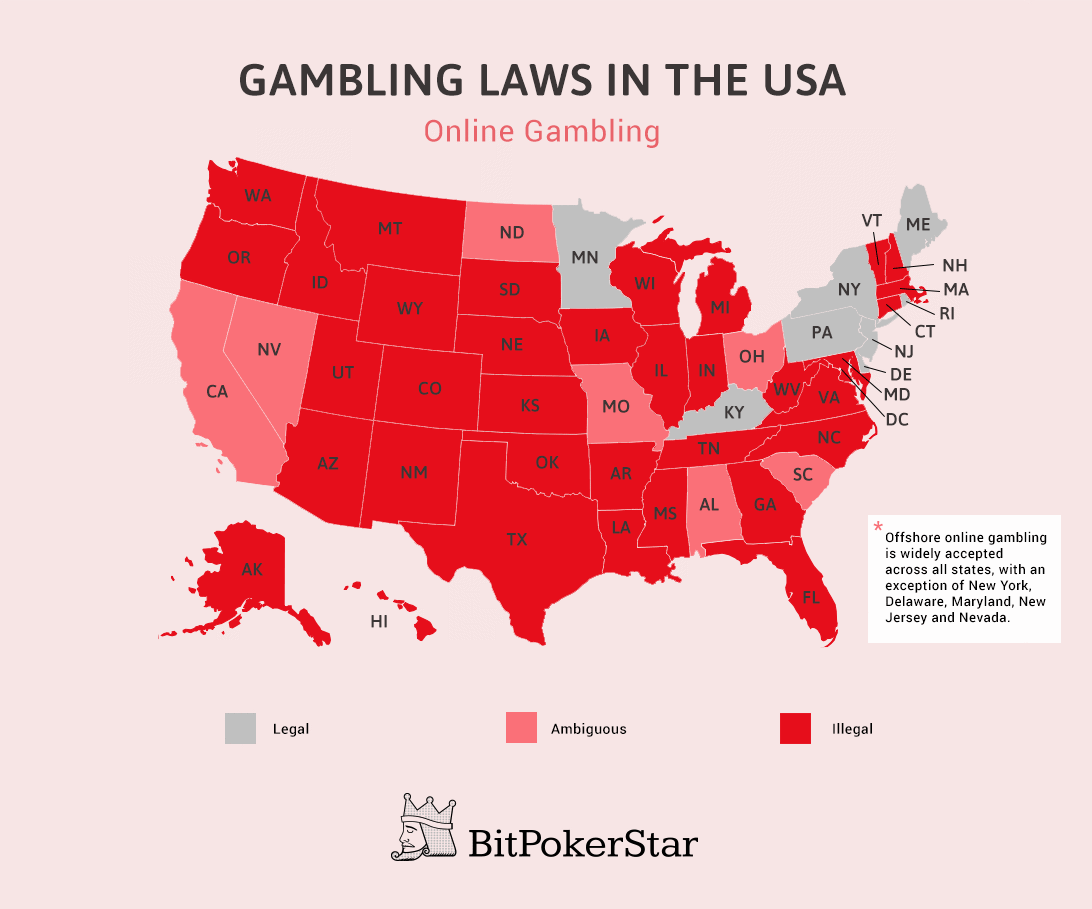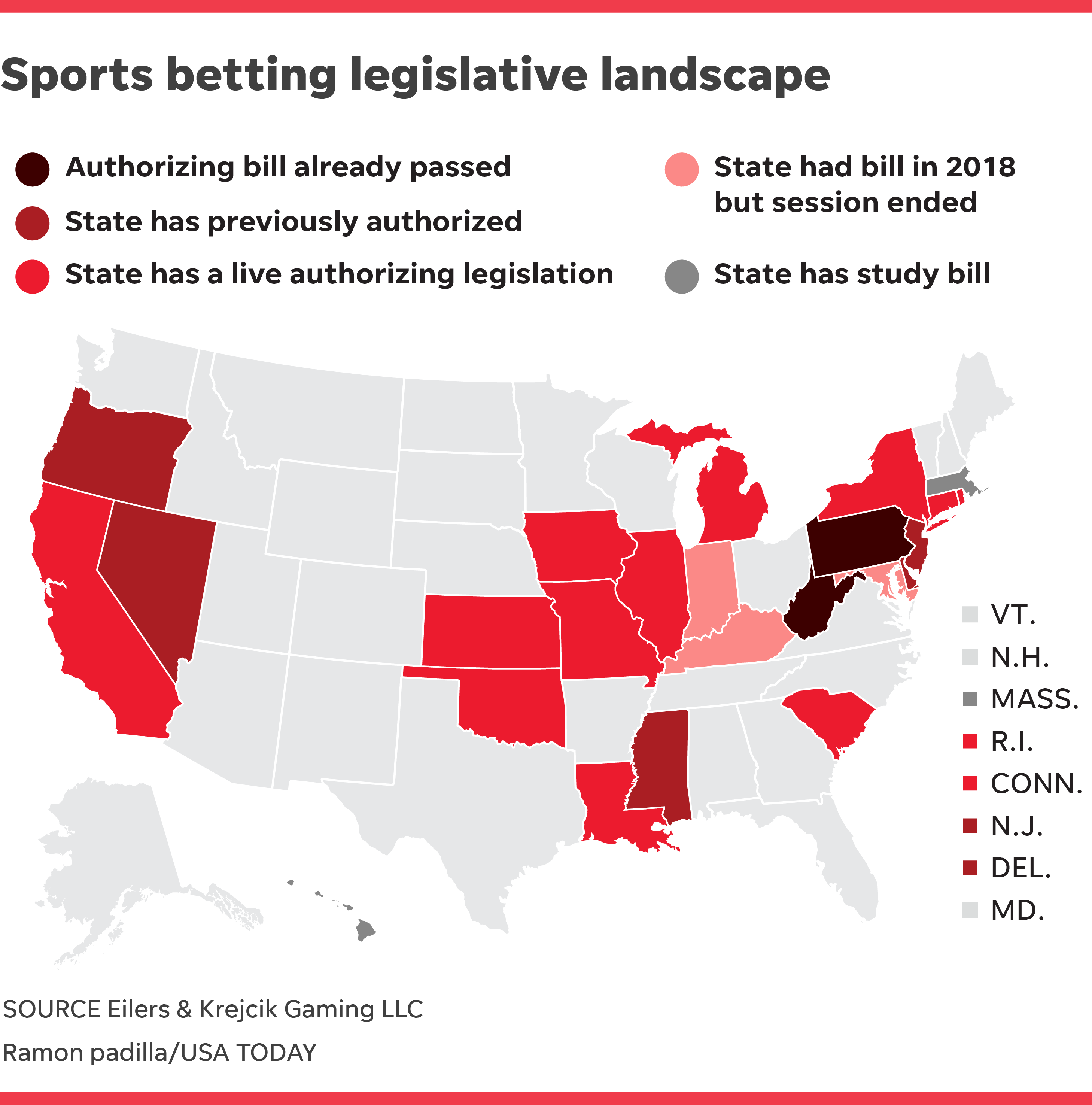Explicitly Legal States There are six US states where all types of gambling are perfectly legal. Delaware, Illinois, Iowa, New Jersey, Pennsylvania, and West Virginia have legalized all forms of. Shortly thereafter, Delaware became the first state to legalize online gambling, instituting a divergent online gambling approach allowing for most casino games (slots, baccarat, blackjack, poker, craps, roulette, bingo, wheel of fortune or any variation of these games); however, excluding keno and lotteries.
Unless you live in a few select states like Pennsylvania, New Jersey or Nevada, your state probably doesn’t have broad support for gambling. Sure, you might be able to head to a riverboat or Native American reservation-based casino, but there’s likely only so much you can do.
Even worse, if you want to play poker at home for real money, more often than not, you are simply out of luck. It’s just not legal in your state.
If you like to gamble, this is undoubtedly a bit of a bummer since it can mean long drives or house games to play the game you love. However, there is a rising tide of pro-gambling sweeping state legislatures with states like Colorado and Illinois realizing there is a lot of revenue made of people placing bets.
Therefore, if you are of a mind to get gambling legalized in your home state, now is the time.
With this handy guide, we will look at how gambling became legalized in other states and how you can get it legal in yours.


A Look at a State Where Gambling Was Recently Legalized
To first understand how to get gambling legal in your state, it’s important to understand why it was legalized elsewhere.
Unfortunately, I would love to say that the legislatures that legalized or expanded gambling in the USA did it because they knew how much fun people have playing cards or slot machines. It would be nice to think this was an altruistic gesture of the sloughing off of older laws.

Now, that one word may have been enough to give some of you a minor heart attack. In general, taxes are considered a very bad thing and we want to keep them as low as possible. While there’s a certain argument for that, governments still need money to pay police and firefighters, pave roads, operate schools, etc. etc.
These Are the Good Kind of Taxes
Plus, do you really mind if there are taxes on money if it’s not yours? Of course not!
That’s why Colorado and Illinois decided to expand their gambling operations: they wanted to take a piece of that sweet, sweet gambling revenue. In Colorado’s case, the target of that money was fairly narrow.
Given the fact it’s not nearly as flat as say, it’s neighbor Kansas, Colorado has severe water distribution issues. A water plan put forth by Governor John Hickenlooper in 2015 was to combat this, but it was constantly underfunded and ineffective.
Proponents of legalizing sports gambling passed a bill that allows people to bet on sports in Colorado, but the state gets to take a measly ten percent of the winnings in taxes. This is really a pittance considering some states charge three times that much in taxes for sports betting.
The key thing though is that all of Colorado’s collected sports gambling revenue will now go to pay for the water plan. This amounts to around two million dollars a year.
So, clearly, legalized gambling in Colorado was a humanitarian effort. Right?

The interesting thing is what happens to that tax revenue in a few years. It’s a safe bet that over time it will go to pay for other political initiatives. Still, what the passage of Proposition DD (the measure to legalize sports betting) did was find a way to provide valuable water without raising personal taxes.
Illinois Plans for Gambling
Illinois’ strategy for expanding was far more broad and bigger in scope. Frankly, if you’ve lived in Illinois, you may have noticed they have a tendency to charge really high taxes.
A discussion on how those taxes are deployed and the state’s history of corruption is, of course, beyond this article.
What Illinois decided to do was make themselves the destination for gambling in the middle of the country. To do that, they legalized sports gambling and almost doubled the number of state-sponsored gambling positions (places to bet). There will also be a massive, privately-owned casino within the city limits of Chicago, thus removing the need to drive to get your gamble on.
This in a state that already had massive casinos and race tracks from which you could bet locally and international races.
Will the plan pay off? Nothing is ever certain in either gambling or politics. However, estimates on one website believe that Illinois stands to make nearly three billion dollars in one-time fees for the expansion and add 470 million dollars annually after that.
That’s a lot of dollars that can be used for civic projects without raising taxes on the individual one cent.
How the Legislative Process Works (Briefly)

Gambling Legalized States 2019
The legislative process is not complicated, but it’s not small, either. I really, really don’t want to break into a civics lesson in the middle of a gambling post, but it probably is worth mentioning a few details. Hopefully, it will help guide you to getting gambling legal in your state.
In brief, a law doesn’t just hatch into being. There’s a lot of (mostly completely boring stuff) that goes on to make a law.
Also, keep in mind this applies to state laws. The United States Federal government is mostly the same, just bigger.
First, typically, a bill has to be introduced into the legislature. This is normally done by a member of either the state house or senate (except in Nebraska which only has a senate). The member who introduces the bill often has other senators/representatives “sponsor” the bill, which means they lend their public support to it.
Anyway, once the bill is introduced it’s sent to a committee, debated on and then voted on. If the committee sends the bill to the larger house, it is again debated on and voted. If it is voted on there, it’s sent to the part of Congress where it’s debated on and voted on.
If it passes there, it’s sent to governor who will sign it into law or veto it and say it’s not going to be law. In which case it can be overturned.
And basically by the time the debate’s over you could have just moved to a state with more liberal gambling laws…
How to Get Gambling on the Docket
Still with me through all that law stuff? Good because you now have an action plan.
You can either figure out the laws around petitions in your area or you can call your local state representative and senator and ask for a meeting. When you go to meet with them, have you guessed what you’re going to say?
If not, go reread what I said about Colorado and Illinois gambling. You are going to have a hard time convincing anyone to legalize gambling for its own sake. All the anti-gambling side will need to do is tell sad stories of families who were wrecked by gambling and make moral arguments.
(Which by the way, the whole wrecked family thing is something you are going to have to answer for yourself. There’s good evidence that casinos and gambling cause social harm.)
It’s All About Millions of Benjamins
That’s why you’re not going to argue to legalize gambling. You’re going to find some cause X that needs a few million dollars in funding (might I suggest something in the agricultural, education, or policy spheres) and say that you’ve found the answer: legalized gambling.
There are very real statistics on how much money can be generated by gambling. It’s largely proven that gambling makes money and the taxation of that money does more good than the social harm caused by casinos, gambling addiction, etc. (Which, by the way, you will offer to offset by taking some of the proposed money to open up gambling addiction centers and other social programs.)
This is going to take some homework on your part and listening to your community. However, sure enough, you will find an issue that you can solve with some additional revenue.
Legalized gambling in the US will be the way to find that additional revenue.
States Without Legalized Gambling
Type all of that up, add some charts about the money to be earned, talk about ways you will offset perceived social ills and meet with your representatives.
Gambling Legalized States 2020
Conclusion
Legalized Gambling Number Of States
Once you meet with your representative or senator, expect to be rejected. Also expect to meet with them again (and this time bring business leaders.) Over time, you can convince your congressional reps to consider sponsoring your bill.
States With Legalized Gambling
If you can find an issue that has bipartisan support (like water rights), your rep can even get leadership from across the aisle to support the bill. After that, it’s a matter of keeping the public supporting the bill and, after a lot of debating, you might just be able to gamble legally in your state.